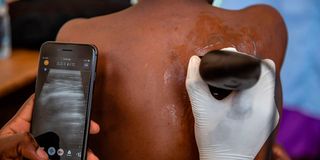Revolutionary handheld ultrasound scanner rolled out

Rodgers Muhumuza, a clinical officer, checks Owamani Bruce for pneumonia using a Butterfly iQ, a hand-held ultrasound scanner, in Uganda's Kabale district, Jan. 29, 2019. The device, which experts hope will revolutionize front-line global medicine, brings medical imaging to remote communities, often for the first time.
US-based digital health company, Butterfly Network, has announced the deployment of 500 Butterfly iQ+ devices to healthcare workers (predominantly midwives) in Kenya to support maternal and foetal health.
The Butterfly iQ+ is the world’s first handheld, single-probe whole-body ultrasound system using semiconductor technology.
“We have created it by putting ultrasound in a semiconductor chip. Much like you have the semiconductor chip in the image sensor on your phone, we’ve put a semiconductor on a chip. And with it, we’ve been able to create a device and technology that can image the entire body with a single probe,” said Darius Shahida, the chief strategy officer and chief business development officer at Butterfly Network.
Traditional ultrasound is costly and cumbersome. It also requires multiple probes for different parts of the body. The new gadgets change that because they can be carried in the pocket and that with a single probe, one can image the entire body.
In partnership with the Bill & Melinda Gates Foundation, Kenyatta University, Global Ultrasound Institute, and software company Jamf Butterfly Network recently brought together 50 midwives who were each provided a Butterfly device and obstetric ultrasound training as part of the launch.
Through a training-of-trainers programme, 500 practitioners will be taught by the end of the year by the Global Ultrasound Institute, bringing ultrasound capabilities to over 50 facilities in rural, underserved communities facing maternal health challenges.
“Kenya is the perfect example and a perfect place for us to introduce the technology to help combat some of the disparities in access to medical imaging. Also, Kenya represents one of the most innovative countries and economies in Africa,” said Mr Shahida.
According to the World Health Organisation Regional Office for Africa, about 830 women die from pregnancy- or childbirth-related complications around the world every day, with more than half of these deaths occurring in Sub-Saharan Africa.
Earlier this year, the company announced that it will provide 1,000 healthcare workers (predominantly midwives) in Sub-Saharan Africa with the device.
Speaking at the launch, Kenyatta University’s acting vice chancellor Waceke Wanjohi attributed the success of maternal health in the country to such initiatives.



